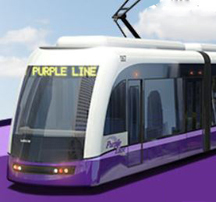Transit Advocates ask MD, VA & DC to Save Metro Service
Press release issued by Transit First!, Feb. 24, 2010
The Transit First coalition, representing transit riders, environmentalists, labor, and community groups throughout the Greater Washington area, called on the state and local jurisdictions responsible for Metro to contribute their fair share to avoid devastating service cuts.
Metro faces a $190 million deficit in next year's operating budget and current proposals call for fare hikes and major service cuts. Transit First urged the governments of Maryland, Virginia and D.C. to provide $74 million needed to avoid scores of debilitating reductions to rail and bus service to balance Metro's fiscal year 2011 budget.
"We are calling on our governments to provide the funding necessary to stave off devastating cuts to rail and bus service," said Cheryl Cort of the Coalition for Smarter Growth. "Riders will be doing their share by paying higher fares - so the jurisdictions need to do their part for a transit system that is essential to our region's economy," she said.
To close the $190 million gap in Metro's operating budget next year, the agency proposes 15 to 20 percent increases in fares ($90 million) and a long list of service cuts ($34 million). The cuts include ending 8-car trains during rush hour, lengthened waits between trains and buses, later openings, earlier closings, elimination of bus routes or parts of bus routes, severe Yellow line cuts, and Metro station and mezzanine closings on weekends. The fare increases and service cuts still leave a $40 million gap. Providing the funding necessary to avoid the service cuts would cost another $34 million for a total of $74 million.
"The economic cost of the proposed service cuts and fare increases would be severe, including more traffic, as well as hardship on lower income workers paying higher fares and facing loss of jobs that they can no longer reach by transit," said Jimmy Allen, co-chair of Prince George's Advocates for Community-based Transit.
"It's not fair for transit riders to bear the entire burden of increasing costs while automobiles are increasingly subsidized by taxpayers," said Transit First chair Ben Ross. Ross pointed out that Metro fares have gone up five times since gasoline taxes were last raised in 1993.
Advocates asked the Metro Board to ensure public input and full consideration of alternatives. "The Board needs to put as many options on the table as possible to avoid service cuts," said David Kaplan, an Alexandria transit rider.
Transit First! proposes the following principles for addressing the Metro budget:
1. Avoid cuts to bus and rail service.
2. Maintain peak period capacity and off-peak frequency of service if any adjustments are made to schedules to realize cost savings.
3. Bus priority savings - require each jurisdiction to generate cost savings by implementing bus priority corridors or pay the lost savings in cash. Bus priority treatments include dedicated bus lanes, queue jumpers, and signal priority.
4. Member jurisdiction contributions should equal $74 million to avert service cuts and avoid higher fare increases. Given the benefit of transit to all the public - transit riders, drivers and others - the jurisdictional contributions to Metrorail and Metrobus should cover a fair share of the budget shortfall.
5. Increase openness for public discussion of budget decisions and longer term improvements to customer service and safety. The Board must provide the public with increased information and offer a full range of options to avoid service reductions.

